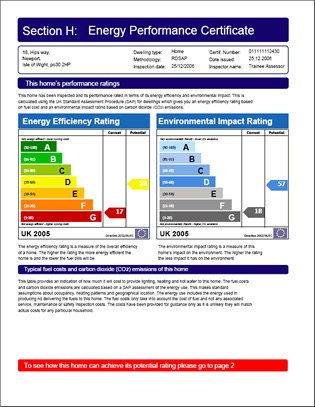
Want to order an EPC Online from £59?
It’s quick and easy, and all of our partners use approved accredited assessors.
Page contents
- What is an Energy Performance Certificate?
- Do landlords need an EPC?
- Where can I get an Energy Performance Certificate from?
- Who can conduct an EPC? What qualifications does the assessor need?
- What’s the purpose of the certificate?
- What is the average energy rating of a house (in England & Wales)?
- How much should Landlords pay for an Energy Performance Certificate (EPC)?
- When do landlords need to renew EPCs?
- What does an Energy Inspection involve?
- Minimum Energy Efficiency Rating / Do I have to improve the efficiency of my property?
- Improving energy efficiency
- What are the penalties if I do not provide an EPC?
- Download Free EPC Receipt of Acknowledgement Form
What is an Energy Performance Certificate?
An EPC shows the energy efficiency levels of a property, so a prospective tenant is able to help determine and compare the relative financial running costs of renting your property. The certificate will give each building a SAP (Standard Assessment Procedure) rating, graded from A to G (A is very efficient and G is very inefficient), similar to those already seen on white goods.
The certificate will include the following information:
- An estimation of the energy the property potentially uses
- Fuel costs i.e. an indication of how much it will cost to heat and power the property
- Details of potentially savings that could be made if energy efficiency improvements are made
- Carbon dioxide emissions
- Details of the person who carried out the assessment
- Who to contact for complaints
The EPC is formed by a qualified Energy Assessor making a visit to your rental property and gathering vital information about the property in order to produce the certificate.
This is an example of what an EPC looks like:

Do landlords need an EPC?
As per the 2018 ‘Minimum Level of Energy Efficiency’ standard, Landlords in England & Wales must provide an Energy Performance Certificate for their domestic private rented properties to all new and prospective tenants, and have a EPC rating below ‘E’, unless they qualify for an exemption (I discuss this further in the Do I have to improve the efficiency of my property? section).
The certificates (EPCs) should be provided at no cost to prospective tenants and should be shown before any tenancy is formed i.e. during the viewing.
Section 21
From October 2015, if landlords in England (not Wales) fail to show prospective and existing tenants a valid EPC, they will not be complying with the latest Section 21 regulations, therefore will not be able to serve a valid Section 21 notice.
As per the Gov guidelines on issuing a valid Section 21 notice:
You must have given your tenants a copy of the property’s Energy Performance Certificate before they rented the property.
Landlords must serve a valid Section 21 notice if they wish to legally terminate a tenancy with a “no fault” possession order.
General rules
- Each property is required to have it’s own EPC’s, it is not based on a “per tenant” or “per landlord” basis. However, where a tenant sub-lets a dwelling, the responsibility to make an EPC available lies with the sub-leaseholder.
- Landlords and agents need to have an EPC within seven days or marketing a property or risk getting a penalty from Trading Standards.
- If you have a lodger an EPC is not required.
Where can I get an Energy Performance Certificate from?
Typically, EPCs are purchased the following ways:
- A local energy assessor: this can often result in the cheapest option, although it’s also the most tasking if you don’t know a local energy assessor or can’t get a recommendation, as you’ll need to search around for one. Try Googling “Energy Performance Certificates provider [insert county]“
- Estate or letting agent: most agents will provide the option of ordering an EPC through them as an “add-on” product to their core service, but it’s usually the most expensive option by far! Agents often put on a 50% mark-up, which is why I often recommend avoid buying one from them.
- Skipton Building Society (FREE EPCs offer): I’m mentioning this offer because many landlords have told me they’ve taken advantage of Skipton Building Society’s free EPCs, saving hundreds on EPC fees.
Skipton Building Society savings account holders are eligible for up to 10 free EPCs (limited to one per property), which is incredible.
So if you have a savings account with them (or want to sign up to benefit from the freebie, which could result in big savings for landlords with multiple properties), here is more details on how to bag FREE EPCs.
- Nationwide online supplier: this is my preferred method as it’s by far the easiest and can often be the cheapest solution. Below I have listed a couple of nationwide EPC online retailers that allow you to order an EPC from their website.
| Supplier | Rating | Notes / Includes | Price | |
|---|---|---|---|---|
Supplier | Rating TrustPilot Reviews | Notes / Includes
*Their website says prices start from £34, but the cheapest quote I could get is £59. | Price £59*Inc VAT | Order Online |
Supplier | Rating Google Reviews | Notes / Includes
*If the property is located in Scotland, the price is | Price £79*Inc VAT (Normal price: £89) | Order Online £10 Discount Code: PIP10 |
Please note, I try my best to keep the information of each service up-to-date, but you should read the T&C's from their website for the most up-to-date and accurate information.
Top tips for when getting an EPC
Accredited Domestic Energy Assessor (DEA)
Whoever you decide to use, make sure you ensure that your energy assessor is a current member of an accreditation scheme, as this ensures your energy assessor is operating to professional standards.
An EPC is only authentic if issued by an accredited Domestic Energy Assessor (DEA).
Hit or miss service!
Based on my experience, EPC assessors can be incredibly hit or miss – the quality in service received will mostly depend on who turns up on the day. I guess it’s similar to any contract work though, when you’re not using someone that’s already proven themselves to be competent and trustworthy.
A competent assessor will be diligent, grade your property carefully and accurately, and provide practical feedback on how you can improve the energy efficiency of your property.
Who can conduct an EPC? What qualifications does the assessor need?
There aren’t official outlets for EPCs, they’re available from local tradesmen. But you should always use a qualified professional.
EPCs should be conducted by an accredited energy assessor that is a member of an approved accreditation scheme, for example:
Wherever your source your EPC from, just ensure the assessor is a member of an approved accreditation scheme.
What’s the purpose of the certificate?
The EPC highlights two key areas about a rental property:
- The energy efficiency rating (this is based on how much the home would cost to run). Essentially though, this will largely depend on the lifestyle of the tenants.
- The environmental impact rating (this is based on how much carbon dioxide is released into the environment because of the home)
The rating is based on factors like age, property layout, construction, heating, lighting, and insulation. The ratings are standard so a tenant can compare the energy efficiency of one rental property with another, which may influence their decision when picking a property to rent.
What is the average energy rating of a house (in England & Wales)?
According to the Office of National Statistics, I quote, “Dwellings in England and in Wales had a median energy efficiency rating in band D [in 2023], with scores of 68 and 66, respectively.”
How much should landlords pay for an Energy Performance Certificate (EPC)?
I’ve seen them as cheap as £50, but I’ve also seen them priced at £100. It ultimately depends on the location of the property, from what I’m aware. However, I would definitely shop around for quotes, because it is competitive out there.
Before getting my first EPC I wasn’t entirely sure how much I was expected to pay for one. I’ve heard people mutter prices that range between £60-£100. A local letting agent quoted me £80. You know when a letting agent quotes you a price, you can probably get the same thing at least 30% cheaper from elsewhere.
From what I found, most other companies are charging between £65-85. The majority was hitting the £70 mark. As said, you can order one online from lettingaproperty.com for £69 (VAT inc). If the property is located in Scotland, the price is £99 (VAT inc).
When do landlords need to renew EPCs?
Each certificate will remain valid for 10 years.
Landlords can choose to renew their EPC earlier – at any time for any reason. A common reason is when energy efficiency improvements have been made to the property. In such cases, landlords usually want these enhancements reflected in an updated certificate, as it can improve the overall rating (which is desirable for tenants). Only the most recent EPC is considered valid.
An EPC does not need to be renewed after 10 years unless the property is being put on the market for sale or rent to a new tenant.
As per the government issued domestic private rented property minimum standard guide (PDF),
The only time a new EPC is legally required for a property is if the most recent certificate is more than ten years old, and the property is to be marketed for sale, or for rent to a new tenant.
Therefore, it is not always necessary to renew an EPC every decade. For instance, if a landlord shows a 9-year-old EPC to a new tenant, they will not need to renew it until that tenant leaves, even if that occurs 4 years later. The main purpose of an EPC is to inform prospective tenants about the energy efficiency of a property before they move in, during the marketing phase.
Do EPCs need to be renewed every time a tenant changes? Nope. That’s a common misconception.
What does an Energy Inspection involve?
Booking an Energy Inspection is like booking any other appointment; a convenient time will be arranged to visit the rental property.
During the assessment the assessor will inspect the property and collect information such as external and/or internal measurements, details about the construction, and the type of heating/hot water used in your property. In order to gather the information, the assessor will need to access all rooms, the boiler and the loft.
The assessment of a 3 bed property typically takes up to 60 minutes; larger or complex properties can take longer.
After the assessment, the assessor will send you the EPC and recommendation report. The recommendation report will contain recommendations of how the property’s energy efficiency can be improved. Each recommendation will be accompanied by the typical cost savings per year as well as what the performance rating could be after improvements are made.
Minimum Energy Efficiency Rating / Do I have to improve the efficiency of my property?
If the recommendation report comes back with suggestions to improve the efficiency of your rental property, you are currently NOT legally obligated to act on any of the recommendations.
However, since April 2020, as per the Minimum Energy Efficiency Standards (MEES), it is required for all landlords to ensure rental properties in England & Wales have a minimum EPC rating of ‘E’ for new tenancies and renewals. So if the report comes back with a report lower than a grade E, improvements to raise the rating must be made, unless the landlord qualifies for an exemption, and the exemption is registered on the Public Exemptions Register.
Cost cap to meet the ‘C’ rating
As per the Minimum Energy Efficiency Standards (MEES), there is a cost cap, which means you will never be required to spend more than £3,500 (including VAT) on energy efficiency improvements:
If you cannot improve your property to EPC E for £3,500 or less, you should make all the improvements which can be made up to that amount, then register an ‘all improvements made’ exemption.
There is a full list of exemptions here and details on how to register an exemption.
Labour’s minimum C rating requirement by 2030 proposal!
Labour has proposed that landlords in England & Wales will be required to have at least a minimum C rating by 2030. This has not been confirmed yet (and when/if it does, I will update this blog post), however, many landlords are preparing early in case it comes to fruition.
Improving energy efficiency
The top five recommendations given by assessors for improving energy efficiency have been:
- Cavity wall insulation
- Using low energy lighting
- Using thermostatic valves on radiators
- Loft insulation
- Double glazing windows
What are the penalties if I do not provide an Energy Performance Certificate (EPC)?
The provision of EPCs is enforced by the Trading Standards department of the local authority. If they receive a complaint that an EPC has not been provided they can impose a penalty charge on you of £200 for each breach. As also discussed, in the ‘Landlord requirements’ section above, landlords can face a penalty of up to £4,000 for not meeting the minimum rating of E.
EPC Receipt of Acknowledgement Form
In light of changes to the Section 21 legislation on October 2015 for Landlords in England, it is imperative landlords show prospective tenants a valid EPC before a tenancy agreement is entered.
In order to protect myself, I make prospective tenants sign an receipt of acknowledgement form, which confirms that they have been provided with a valid EPC. You can download a copy of the template by entering your name and email address below.
Disclaimer: I'm just a landlord blogger; I'm 100% not qualified to give legal or financial advice. I'm a doofus. Any information I share is my unqualified opinion, and should never be construed as professional legal or financial advice. You should definitely get advice from a qualified professional for any legal or financial matters. For more information, please read my full disclaimer.


 Landlord Products / Services
Landlord Products / Services






























Bought a property with a D cetificate.Have fitted new A reg boiler,renewed all pipe work,new radiators with thermostatic valves,new programmer,new double glazing,roof insulation,low energy lightbulbs .Even put in new A reg ceramic hob and A rated oven.Still a D.Can anyone explain this to me?
Recomendations were solar heating!! and external insulation.This is a mid terraced house,for goodness sake.
What else can I do to improve efficiency and rating?
Very unhappy